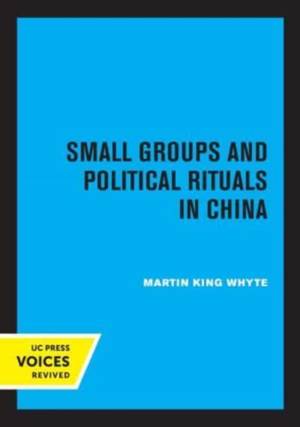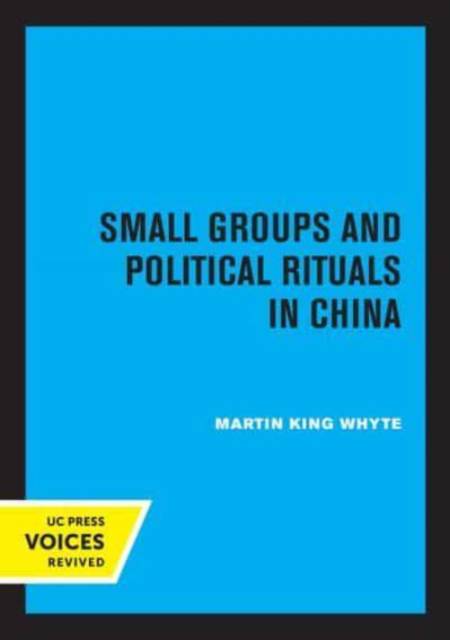
Bedankt voor het vertrouwen het afgelopen jaar! Om jou te bedanken bieden we GRATIS verzending (in België) aan op alles gedurende de hele maand januari.
- Afhalen na 1 uur in een winkel met voorraad
- In januari gratis thuislevering in België
- Ruim aanbod met 7 miljoen producten
Bedankt voor het vertrouwen het afgelopen jaar! Om jou te bedanken bieden we GRATIS verzending (in België) aan op alles gedurende de hele maand januari.
- Afhalen na 1 uur in een winkel met voorraad
- In januari gratis thuislevering in België
- Ruim aanbod met 7 miljoen producten
Zoeken
€ 67,95
+ 135 punten
Uitvoering
Omschrijving
Martin King Whyte's Small Groups and Political Rituals in China examines how the Chinese Communist Party transformed Sun Yat-sen's lament about China as a "sheet of loose sand" into a system of remarkable social cohesion. Whyte's central argument is that political elites achieved this by embedding citizens in hsiao-tsu (small groups of 8-15 people) across nearly all institutions--factories, schools, communes, offices, labor camps, and military units--and by requiring them to participate in political rituals of study, criticism, and self-criticism. These rituals, grounded in Maoist ideology, mobilized peer pressure to reshape attitudes and behavior, creating an organizational model distinct from both Soviet and Western practices. Rather than spontaneous communities, these groups were deliberately designed and supervised by higher authorities, ensuring that even remote or socially marginal individuals were drawn into political life. Whyte contends that the combination of daily work with ritualized political activity generated a "strict political atmosphere" intended to secure compliance and foster ideological transformation. Because China's closed environment prevented direct fieldwork, Whyte relies on intensive interviews with 101 recent refugees in Hong Kong (1968-69), cross-checked against early 1950s Party pamphlets that prescribed how hsiao-tsu should function. Using these prescriptive texts as benchmarks, he develops case studies across five organizational settings--government offices, schools, rural communes, factories, and corrective labor camps--to analyze how closely actual practice matched the ideal. His method is inductive: instead of testing Western small-group hypotheses, he builds generalizations about when and why hsiao-tsu succeeded or faltered in reshaping members' conduct. Differences among cases reveal how organizational structure, leadership, and external pressures shaped outcomes. Ultimately, Whyte shows that small groups and rituals were crucial in the Communist project of national integration and mobilization, but their effectiveness varied with context, and persistent obstacles limited their capacity to fully unify society. The book provides both a portrait of China's distinctive organizational strategies and a broader reflection on how states use ritual and group dynamics to transform political culture. This title is part of UC Press's Voices Revived program, which commemorates University of California Press's mission to seek out and cultivate the brightest minds and give them voice, reach, and impact. Drawing on a backlist dating to 1893, Voices Revived makes high-quality, peer-reviewed scholarship accessible once again using print-on-demand technology. This title was originally published in 1974.
Specificaties
Betrokkenen
- Auteur(s):
- Uitgeverij:
Inhoud
- Aantal bladzijden:
- 285
- Taal:
- Engels
Eigenschappen
- Productcode (EAN):
- 9780520316621
- Verschijningsdatum:
- 25/02/2022
- Uitvoering:
- Paperback
- Formaat:
- Trade paperback (VS)
- Afmetingen:
- 148 mm x 210 mm
- Gewicht:
- 367 g

Alleen bij Standaard Boekhandel
+ 135 punten op je klantenkaart van Standaard Boekhandel
Beoordelingen
We publiceren alleen reviews die voldoen aan de voorwaarden voor reviews. Bekijk onze voorwaarden voor reviews.









